The UK’s Online Safety Act and other things they don’t like to talk about.
Evghenia Gutul, the Leader of Gagauzi, Has Been Arrested in Moldova
According to Usnews; Police in Moldova detained Eugenia Gutul at Chisinau’s international airport late on Tuesday, following the unexplained disappearance of two other wanted pro-Russian lawmakers. Gutul, the leader, or Bashkan, of Gagauzia, was being held for 72 hours in the capital, said Angela Starinschi, an official with Moldova’s Anti-Corruption Centre.
The article goes on to explain:
Gagauzia, a 140,000-strong [autonomous] region in the south of Moldova, is dominated by ethnic Turks who favour close ties with Russia, adhere to Orthodox Christianity and have had uneasy relations with central authorities since Moldovan independence in 1991. Gutul, a fierce critic of the [Maia Sandu] government, was elected Bashkan in 2023.
The UK Is Set to Increase Sanctions on Russia
Among the sanctions there is one on North Korean Defense Minister No Kwang Chol and other North Korean generals and senior officials allegedly complicit in deploying over 11,000 DPRK forces to Russia. Putin is using DPRK forces as cannon fodder (note: this is on the official UK government website); DPRK has suffered over 4,000 casualties. There is no independent confirmation that there are any DPRK troops on the battlefield in the SMO and the South Koreans (who originated the story) showed no evidence of North Korean troops in Kursk, according to European officials who were present for the 90-minute meeting to discuss the matter at NATO headquarters and later spoke to The Associated Press about the briefing on condition of anonymity. However, there is evidence of UK troops operating and being killed on the SMO battlefield. And let us not forget:
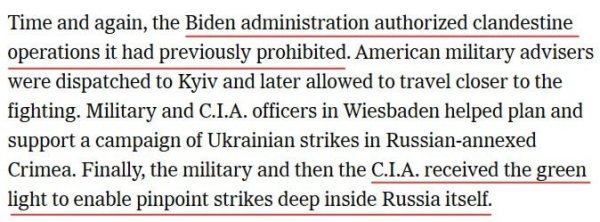
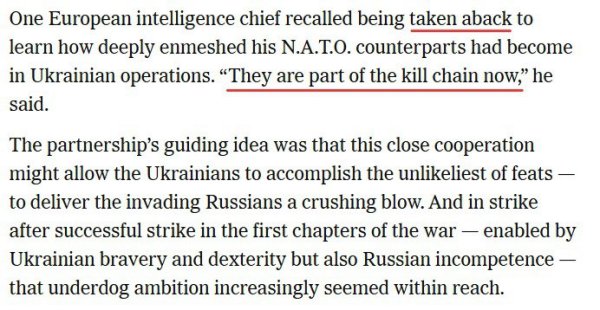
That information came from RT, so, can we believe them? Meanwhile, on the other side of the pond:
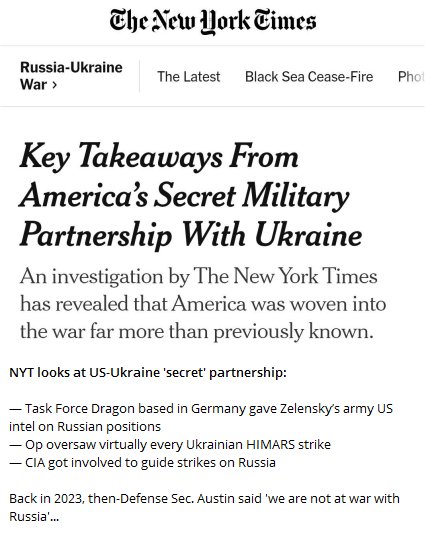
Denmark Is Speeding Up Plans for Mandatory Military Service For Women
In response to President Trump’s threat to annex Greenland, Denmark will start drafting women into the military in 2026, accelerating previous plans to increase the size of its armed force. The comprehensive bill, which “includes full equality and the introduction of conscript lieutenants and sergeants,” will come into effect on July 1, 2025, meaning that women who are 18 or older after this date will be required to serve if there are not enough volunteers.
Copenhagen’s current policy maintains that women can join the armed forces on a voluntary basis but will not be conscripted. Men are called to serve through a lottery system meant to compensate for a possible lack of volunteers.
The Danish government recently introduced a €6.6 billion increase in defense spending. The 50bn Danish kroner “acceleration fund” will be used to make rapid investments in fighting capability aimed at strengthening short-term defense capabilities and meeting NATO requirements.
You can read more here.
The ICC Has Embroiled Itself in an Inter-Family Squabble in the Philippines
The former president of the Philippines, Rodrigo Duterte, is currently being held by the ICC despite the fact that the Philippines no longer recognizes the court. The ICC claimed jurisdiction on the basis of the alleged ‘crimes’ had taken place while the court was recognized there. Duterte’s daughter, who happens to be the Vice President, has condemned his arrest, describing it as a kidnapping. His son, Davao City Mayor Sebastian Duterte, has intimated that this was an inter-family squabble, saying that Duterte senior had shrugged off criticism with regards to a state funeral for the current president’s father yet was now being treated badly in return.
In response to the arrest, the Manila Times, a leading newspaper in the Philippines, said: “the International Criminal Court’s (ICC) case against former president Rodrigo Duterte is an “abomination, a huge, horrific hoax.” They even named the alleged originator of the hoax, a human rights lawyer called Jose Diokno. The US is suspected of having a hand in the arrest, as Duterte was seen as being too close to China; whereas, Bongbong Marcos, the current president, has now allowed the US to install missile systems capable of hitting Chinese interests on its soil.
Duterte, who is 80 years old, has a number of health issues, including Buerger’s disease and Barrett’s esophagus, and the fear is that he’ll be subjected to the same fate as Slobodan Milošević. In February 2007, the International Court of Justice cleared Serbia under Milošević’s rule of direct responsibility for occurrences of crime committed during the Bosnian War. The acquittal took place the year after his death, caused, according to his supporters, by the deliberate withholding of medical treatment for a serious heart condition.
European Gas Supplies Are Depleting at a Faster Rate Than Expected
Cold weather in Europe has caused the region’s natural gas reserves to decline at their fastest rate since 2018. According to data from Gas Infrastructure Europe, storage facilities are currently 70 percent – from about 86 percent at the same time a year ago. Moreover, gas reserves are currently down 25 percent from last year’s peak, the biggest decline in seven years.
Europe is increasingly relying on liquefied natural gas (LNG) from other countries of the world as an alternative to gas imported through pipelines from Russia. This has increased the risk of instability in the market. In addition, the closure of Norway’s Hammerfest LNG plant due to mechanical problems may further intensify market instability.
It is becoming increasingly obvious that the ill-conceived EU sanctions on Russian pipeline gas are primarily responsible for the huge increase in costs and the reduction in supply, as these two charts clearly show:
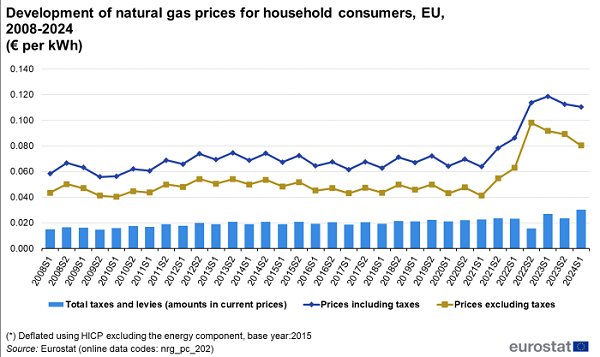
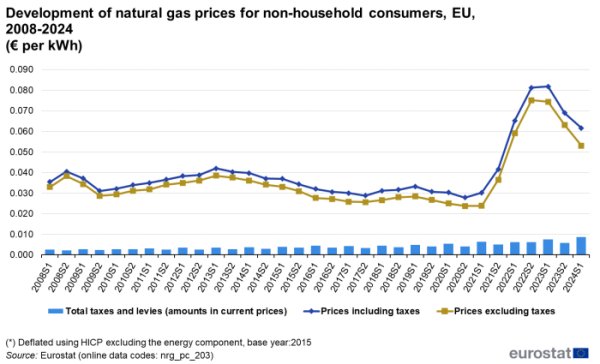
In an attempt to bring gas prices down in Slovakia, which was seriously affected by the Ukrainian decision, allegedly on the urging of the EU commission, to halt European gas transit, the State Oil Company of Azerbaijan (SOCAR) started supplying gas to the largest state-owned energy operator of Slovakia – SPP. Gas supplies are carried out based on a short-term pilot contract between SOCAR and SPP. The companies aim to develop a longer-term energy partnership. Slovakia has become the twelfth country to receive Azerbaijani gas, along with Turkey, Georgia, Italy, Greece, Bulgaria, Romania, Hungary, Serbia, Slovenia, Croatia and Northern Macedonia.
For household consumers in the EU – defined as medium-sized consumers with an annual consumption of between 20 – 200 Gigajoules (GJ), natural gas prices in the first half of 2024 were highest in Sweden, the Netherlands and Austria. They were lowest in Hungary, Croatia and Romania. The price of natural gas for households in Sweden was more than three times the price charged in Hungary (which was still receiving Russian piped gas at the time the figures were tallied) and 59% higher than the EU average price. This map shows the prices for household (non-industrial) gas across the EU.
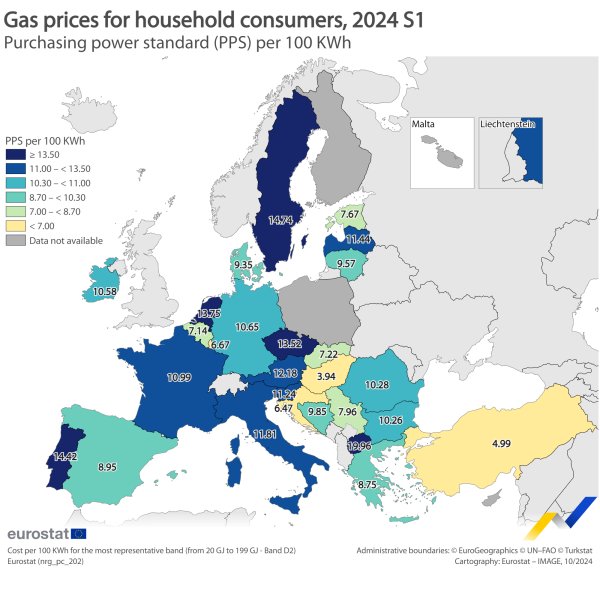
Prices for British consumers is calculated in a different way, so a true like for like comparison is difficult, but the average gas bill for consumers, consuming around 11,200 kWh per annum, is estimated at £814, which roughly works out as €8.65 per 100kW. It should be noted that Britain still has some (albeit depleted) North Sea gas available and enjoys a direct pipeline connection to the Norwegian gas fields.
What Have Hamsters, Bicycles and Green Lifestyles Got in Common?
The answer is the UK’s Online Safety Act, which has just come into force. This badly drafted and overly vague act was inherited from the Sunak government and implemented in its entirety by the Starmer government. The stated purpose of the act was for protecting children and adults online by “allowing them to see only what they want to see,” which in plain English means “allowing them to see only what the government wants them to see”. The previous technology Secretary, Michelle Donelan, said the government was “empowering adults with more choices over what they see online”.
It attempts to do so by requiring that designated online service providers rigorously police content and activity related to 17 categories of harm, including terrorism, harassment, stalking, coercion, hate, intimate abuse images, and child sexual exploitation and abuse (CSEA), among others, on their websites, no matter how small the site itself is or what its reach is. Category one sites will also need to “proactively offer adult users optional tools, to help them reduce the likelihood that they will encounter certain types of legal content.”
As Ofcom, the regulatory body charged with implementing the law, explains, “The rules apply to organisations big and small, from large and well-resourced companies to very small ‘micro-businesses.’ They also apply to individuals who run an online service.”
The rules cover a variety of “user-to-user” services (i.e. any site that allows user comments or publicly accessible feedback) that serve the UK market in a significant way (which was not defined in either the act nor its guidance – its definition being at the whim of Ofcom, the UK’s ‘independent’ online censor), whether they’re inside or outside the country. This includes social media sites, photo and/or video sharing sites, chat, blogs, forums, instant messaging services, dating services, and gaming services. The rules also cover search services, although Britain appears to have no internet search companies of its own. Through this act, the UK government is attempting to regulate the whole of the internet.
Under the terms of the online safety act anyone who runs a website, anywhere in the world, that is accessible to people living in the UK, has to undertake a time-consuming and meticulously detailed audit of their site(s). They then have to create a full risk assessment and to put in place various mitigations (e.g. more effective content filtering technology – including image hash comparisons with a list maintained by Ofcom – and moderators and/or fact checkers) to deal with identified risks.
The form that this risk assessment should take appears not to have been defined either, but any individual site owner who doesn’t complete it to Ofcom’s satisfaction would be subject to a fine of up to £18 million ($22 million) or 10 percent of their global revenue, whichever is greater. There’s also the potential of criminal liability and prison for the designated site managers (who have to be named as part of the compliance procedure) who have ignored or not known about these obligations or failed to fulfil them to Ofcom’s satisfaction.
In order to ensure compliance, Ofcom has created an online regulation checker to help those operating web services understand whether they’re obligated to comply. On the site, it says that you should allow at least an hour to complete the form, which is a waste of time as it almost always says you need to comply if you run a site that allows user interaction.
According to Neil Brown, director of British law firm decoded legal, any website operator who allows a forbidden off-topic post to appear on their site could be liable, particularly as there are no clear directions as to what their obligation is.
“As with quite a lot of the Online Safety Act, even with Ofcom’s tomes of guidance, the answer to some of these most basic questions, particularly in the context of services provided by individuals, is, at this point at least, ‘sod knows,’” Brown said. He also said he intends to put this question directly to Ofcom, though he doesn’t expect a straight answer.
The Online Safety Act obligations came into force on March 17, 2025, and large website operators were already concerned. Several, like London Fixed Gear and Single Speed (a site devoted to cycling), have stated that they will shut their online forums rather than attempt to comply. And outside the UK, online discussion site Lobsters has implemented a geoblock that will prevent UK visitors from accessing the site after March 16. In addition, a site dedicated to the care of Hamsters and another for sustainable, green lifestyles, have been closed. It is estimated that 100s of sites have closed down or have blocked visitors from the UK, rather than trying to wade through the morass of compliance procedures and then being prosecuted for failing to take down a prohibited post fast enough (the rapidity of which is not defined either).
An example of a prohibited post is, “Presenting information—even factually accurate information—in a way that amounts to misrepresentation”. What does that even mean? For example, is saying that “The UK is currently in the middle of an economic crisis and the chancellor is making it worse” prohibited?
The problem is that nobody actually knows; because Ofcom, an unelected body run by an ex-TV magnate and an economist, has been mandated to draw up the rules and they haven’t. Which begs the question of where are the elected representatives in all this? Isn’t it their job to draw up a list of the rules? Moreover, these rules, if and when they come into being, can be changed at will by the Home Secretary on the advice of Ofcom. And the vagueness of the provisions in the act means that the whole communication ecosystem in the UK can be altered at the whim of a minister at some time in the future.
What Ofcom have produced is a report on Illegal content, Codes of Practice for user-to-user services. This document sets out the duties of anyone involved in the website (the provider) outlining their bureaucratic duties under the act. For example, one of their duties is:
The provider should have an internal monitoring and assurance function to provide independent assurance that measures taken to mitigate and manage the risks of harm to individuals identified in the risk assessment are effective on an ongoing basis.
The results of which would be provided to the site’s audit committee. Who would comprise that committee on, say, a website run by a Hamster enthusiast?
And it’s not just the onerous and ever-changing bureaucracy that will cause pause for any UK based or foreign website that may be accessed by a UK dweller, it is also the actual costs of compliance:
Section 84 Duty to pay fees: OFCOM may require a provider of a regulated service to pay a fee in respect of a charging year which is a fee-paying year. The fee is based on the provider’s qualifying worldwide revenue for the qualifying period relating to that charging year, and any other factors that OFCOM considers appropriate and made in the manner that OFCOM considers appropriate.
So, they can charge whatever they like and the hapless website owner has to pay.
In addition, companies that supply services to people using the internet should withdraw their service from a named individual or company when it’s suggested by Ofcom. They even supplied a list of the type companies or services to which these suggestions would be aimed:
- Internet Service Providers and Mobile Network Operators
- Content Distribution Networks
- Anonymizing services (VPNs, proxies)
- Domain Name registration services (registry and registrar)
- Auxiliary services (e.g. payments, certification authorities)
- Advertising networks
- Web hosting
- Browsers
- App stores
- Device operating systems
- Cloud storage
In other words, Ofcom want VPNs, apps, browsers, web hosting and operating systems worldwide essentially under their control. But, of course, it’s only voluntary and it only applies to services related to transferring child abuse images.
At least at the moment.
One of the 17 prohibited items outlined in the act is “Foreign Interference”. As to what this interference amounts to, Ofcom undertook a ‘study’, which it presented for our enlightenment in the form of a turgid and heavy going report, which basically says that foreign news sites present information differently to UK based news outlets (which are under the control of the DSMA), so they must be banned.
The act is not without its levity though.
For example, consider Section 1, subsection 3(ii) of the act, which says that sites must ensure that: “users’ rights to freedom of expression and privacy are protected”. How will this be done and what the penalties are for not doing it, we were not told. This is concerning as the Electronic Frontier Foundation said the act will lead to a further erosion in UK citizen’s freedom of expression rather than having them protected.
What actually constitutes the right to free expression (aka freedom of speech) in the UK? According to the law (and Tony Blair), the Human Rights Act provides the over-arching definition:
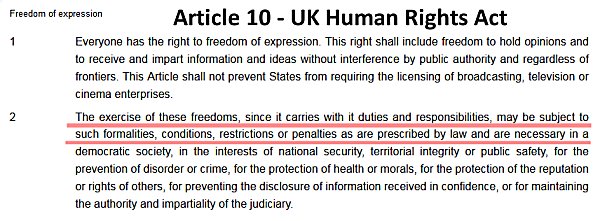
Note that subsection 2 effectively nullifies subsection 1. So, it could have been more simply put as “Everyone has the right to say exactly what the government allows them to say.” The Human Rights Act, unlike the US Constitution and Bill of Rights, appears to be designed to protect the government from the people, rather than the other way around.
How does this UK ‘freedom of speech’ as enshrined in the HRA, operate in practice? Take this case, where a small group of Quaker women were discussing Gaza and climate change in their house of worship. Twenty police officers, some of whom were armed with Tasers, smashed open the door and arrested the six women apparently stating that they were in breach of the Police, Crime, Sentencing and Courts Act 2022 and the Public Order Act 2023 as they were thought to be planning a protest..
As the article says “… changes in judicial procedures limit protesters’ ability to defend their actions in court. All this means that there are fewer and fewer ways to speak truth to power.” It goes on to say: “Quakers support the right to nonviolent public protest, acting themselves from a deep moral imperative to stand up against injustice and for our planet.”
This seems to be part of a pattern of restricting freedom of speech for Christians, like in Aldershot and Farnborough where the local Labour led council (the same party as the government) has banned Christians from telling people the good news or even in giving passers-by Bible tracts. Despite this being a part of British culture for centuries.
You can read a legal case study and commentary on the Act here.
You can find a very enlightening video regarding the Act and the general degradation of the British legal system by a legal expert here. It is worth watching as it highlights the growing trend of ‘two tier justice’, where certain categories of people are treated more leniently based on things such as race, religion or sexual orientation.
This has led to the Prime Minister being dubbed ‘Two-tier Keir’. During the discussion, mention was made of sentencing guidelines where certain types of offenders are to have their cases be subject to a pre-sentence report to find reasons to have their sentences reduced or be subject to community service instead of jail, while others have no such privileges. The pertinent part of the report is shown below and the whole thing can be read here.
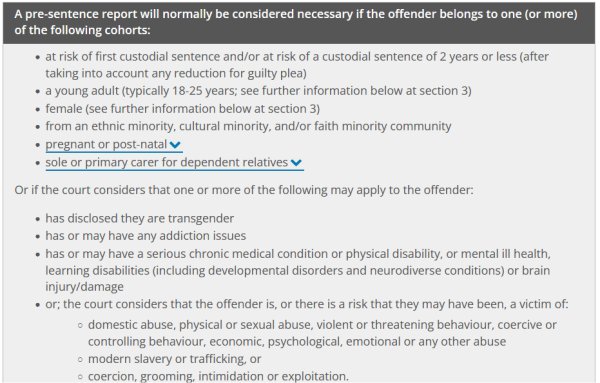
STOP PRESS: Keir Starmer has expressed his opposition to the sentencing guidelines but laments that the sentencing council won’t change them even though he asked them to: “Look, I’m disappointed in this response, and the lord chancellor is obviously continuing to engage on this, and we’re considering our response. All options are on the table. I’m disappointed at this outcome, and now we will have to consider what we do as a result.” When asked if the government intended to introduce legislation regarding it he said: “all options were on the table and that Shabana Mahmood, the justice secretary [and the person in charge of appointing the members of the council], has described the current guidelines as unacceptable”.
France Sends a Survival Manual to all of its Citizens
That’s very nice of them, but why?
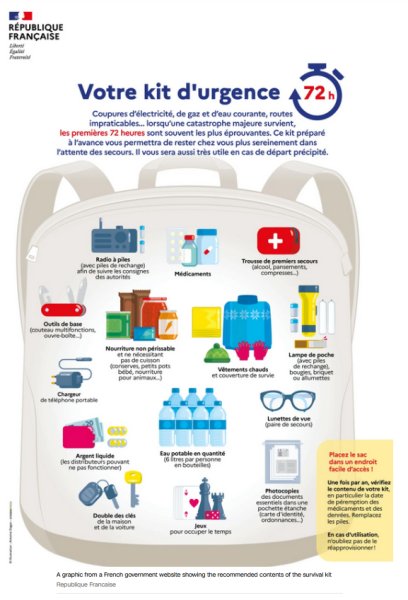
Note: this guide would not be applicable in the UK as knives are banned.
And France isn’t the only place ramping up the FUD.


